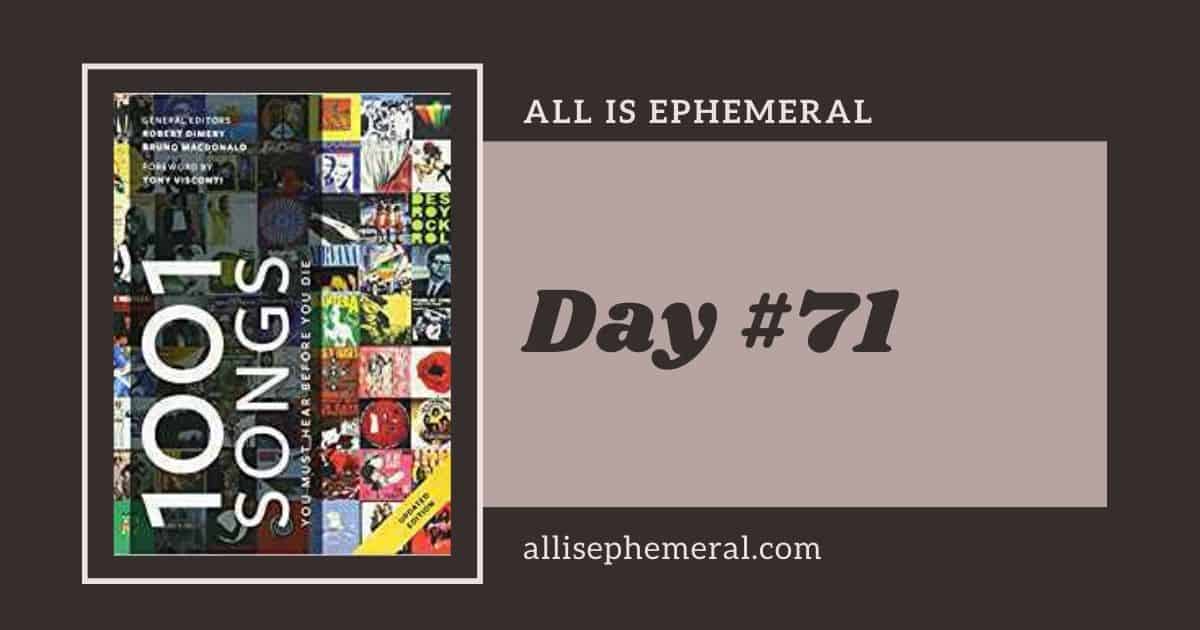
1001 Songs Challenge #70: Ev’ry Time We Say Goodbye (1956)
 On 11 February 2019 I set myself the challenging of reading 1001 Songs You Must Hear Before You Die by Robert Dimery (ed.) and following the book’s advice to the letter. I’ve previously read 1001 Films… and started 1001 Albums… but felt 1001 Songs… would be a sensible place to start for what I have in mind here.
On 11 February 2019 I set myself the challenging of reading 1001 Songs You Must Hear Before You Die by Robert Dimery (ed.) and following the book’s advice to the letter. I’ve previously read 1001 Films… and started 1001 Albums… but felt 1001 Songs… would be a sensible place to start for what I have in mind here.
My challenge is to read about one song per day and listen to it (YouTube and Spotify, I need you tonight!) before sharing my own thoughts. Some songs I will love, others I’ll hate, and I’m sure there will be those that leave me perplexed but listen to them I shall.
I’ll also try, and most likely fail, to pinpoint the best song from the 1001 on offer but I’m nothing if not foolhardy. Instead of one song, I’m predicting I’ll have about 100 favourites by the end and may have to resort to a Top 10 so far to maintain any semblance of sanity.
of one song, I’m predicting I’ll have about 100 favourites by the end and may have to resort to a Top 10 so far to maintain any semblance of sanity.
So long as I post everyday (including Christmas) then this challenge should come to an end on Wednesday 8 November 2021. Staying with the Barney Stinson theme I am hoping that the whole experience will prove to be…
Ella Fitzgerald – Ev’ry Time We Say Goodbye (1956)
Ev’ry Time We Say Goodbye
” Ev’ry Time We Say Goodbye” is a popular jazz song with lyrics and music by Cole Porter. Part of the Great American Songbook, it was published by Chappell & Company and introduced by Nan Wynn and Jere McMahon in 1944 in Billy Rose’s musical revue Seven Lively Arts.
It’s a third song in a row from Cole Porter today. This was written in 1944 and used in the musical Seven Lively Arts. As with many of Porter’s songs, this has been covered by many artists but for this list we have a second appearance from Ella Fitzgerald in the 1001 Songs and it is her version that is considered the best of the lot.
Ev’ry Time We Say Goodbye is self-explanatory. The narrator sings of the joy of being with someone but then shares the pain and heartbreak of what it is like when they are not there. The song uses a striking analogy in the form of music, comparing the parting of the loved ones as the same as a change from major to minor. On the surface, it seems a very simple song but there is a lot of emotion and meaning to the words.
pain and heartbreak of what it is like when they are not there. The song uses a striking analogy in the form of music, comparing the parting of the loved ones as the same as a change from major to minor. On the surface, it seems a very simple song but there is a lot of emotion and meaning to the words.
This song came from Ella Fitzgerald recording a cluster of Cole Porter’s songs and is said to have revived what was in danger of becoming an ailing career. Fitzgerald would survive and continue to thrive. Her unquestionably great voice is on show here and the emotive nature of Cole Porter’s song comes through and thrives in her very capable hands.
Favourite songs so far:
Edith Piaf – La Vie en Rose (1946)





